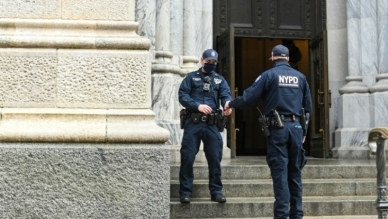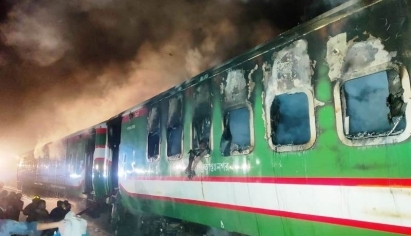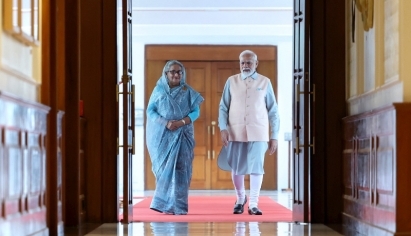latest headline
Holy Shab-e-Qadr today
Soon the situation in Chittagong Hill Tracts will be calm: Obaidul Quader
KNF attack to loot money and show capability: RAB
Kidnapped manager of Sonali Bank returns to his family
Home Minister to visit Bandarban tomorrow to inspect situation
Holy Shab-e-Qadr today
Soon the situation in Chittagong Hill Tracts will be calm: Obaidul Quader
KNF attack to loot money and show capability: RAB
Kidnapped manager of Sonali Bank returns to his family
Home Minister to visit Bandarban tomorrow to inspect situation
FBCCI demands rise in tax free income limit to Tk4.5 Lakh

Holy Shab-e-Qadr today
Dhaka, April 6: Today is the holy Lailatul Qadr or Shab-e-Qadr. Shab-e-Qadr will be observed across the country from this ...
President urges to spread spirit of liberation war and communal ...
Dhaka, March 29: President Md. Shahabuddin called upon all the forces supporting the liberation war to work together regardless of party affiliation to spread the spirit of liberation war and communal harmony at the grassroot level. Read More>>
Muktijoddha returns state award citing corruption ... Liberation War Affairs Ministry cancels directive ... Order to preserve 5 percent Muktijoddha quota ... Brave freedom fighters who come to get services ...PHOTO FEATURE
Chittagong Test: Sri Lanka beat Bangladesh by 192 runs, clinch ...
Dhaka, April 3: Despite a gallant resistance from Mehidy Hasan Miraz, Sri Lanka clinched the two-match Test series 2-0 against Bangladesh by beating the Tigers by 192 runs on the fifth day (Wednesday, April 3) of the second Test in Chittagong. Read More>>
India women team to tour Bangladesh before ... Bangladesh beat Sri Lanka in 1st ODI Barishal beat Comilla to clinch maiden BPL ... Habibul Bashar appointed as the new head ...
Entertainment
Apu Biswas praises Shakib's American actress
Entertainment Reporter, Dhaka, 5 April 2024: For the first time, the leading actor of Dhakai cinema Shakib Khan has paired up with American actress Courtney ... Read More>>
'Maya' movie trailer out, film ... Actor Rumi suffering from cancer The first song of Shakib's 'Rajkumar' ... Moyna to screen in South KoreaFinance
FBCCI demands rise in tax free income limit to Tk4.5 Lakh
Dhaka, April 5: Taking into account the current inflation and the real income of low-income people, the top business association FBCCI has demanded that ... Read More>>
BDBL merging with Sonali Bank, ... Growth in export earnings increased ... 1650 metric tons of onion imported ... PM seeks more assistance from ADB ...Column
Hollowness of West’s ‘democratic debate’ in Bangladesh
Bangladesh is heading for the general election in January, with 29 parties in the fray. Read More>>
15 years of Hasina: An exemplary ... Bangladesh: From a shadow of Pakistan ... Secularism vs. Theocracies: Bangladesh ... Indicators of Universal Health ...South Asia

India stops onion exports to Bangladesh ...
Own correspondent, Dhaka, 24 March 2024: India has imposed an indefinite ban on onion exports. This information was given in a statement issued by the ... Read More>>
India gives permission to export 50,000 tons ... Indian PM Narendra Modi condoles Bailey Road ... India proud to be a partner in Bangladesh's ... Medical tourism bolstering Bangladesh-India ...World

Bangladeshi-origin youth shot dead ...
New York, March 29: A Bangladeshi youth was killed in New York police firing in the United States. The deceased has been identified as Winn Rosario (19). ... Read More>>
16 Bangladeshis directed to leave Saudi Arabia ... Malaysia sends back over 2,500 Bangladeshis ... Victoria, Crown Princess of Sweden, in Dhaka Hijacked Bangladeshi cargo ship heading towards ...Travel

High speed train to run on Jessore ...
Dhaka, March 30: The people of the southwest region are one step away from fulfilling another dream with Padma Setu. The dream of Jessore residents to ... Read More>>
Eid: Advance sale of train tickets to start ... Bogra-Sirajganj rail project: Travel time ... 436-seater Airbus A330-300 joins US-Bangla ... Indefinite travel ban on Saint Martin from ...

